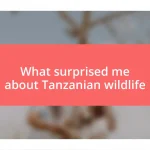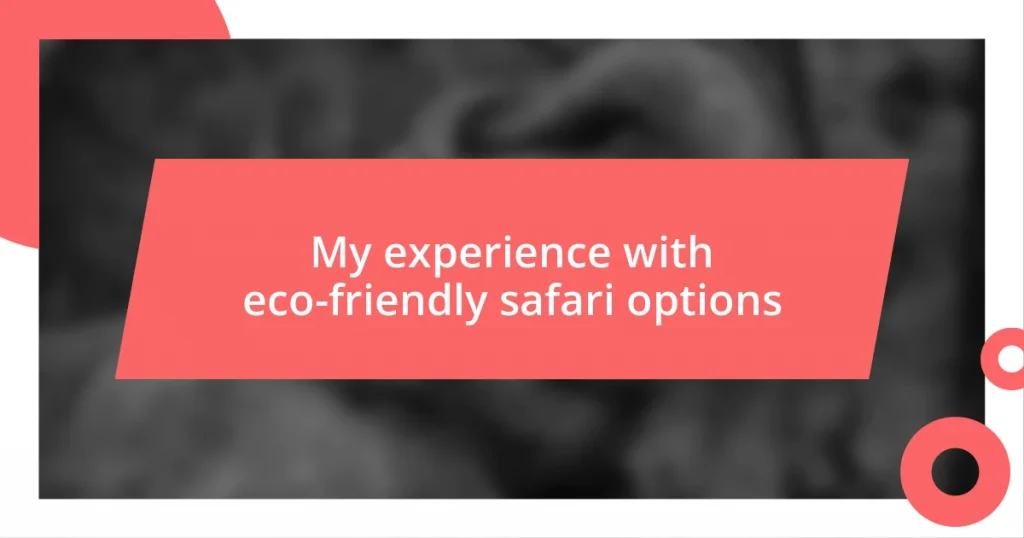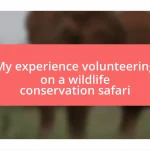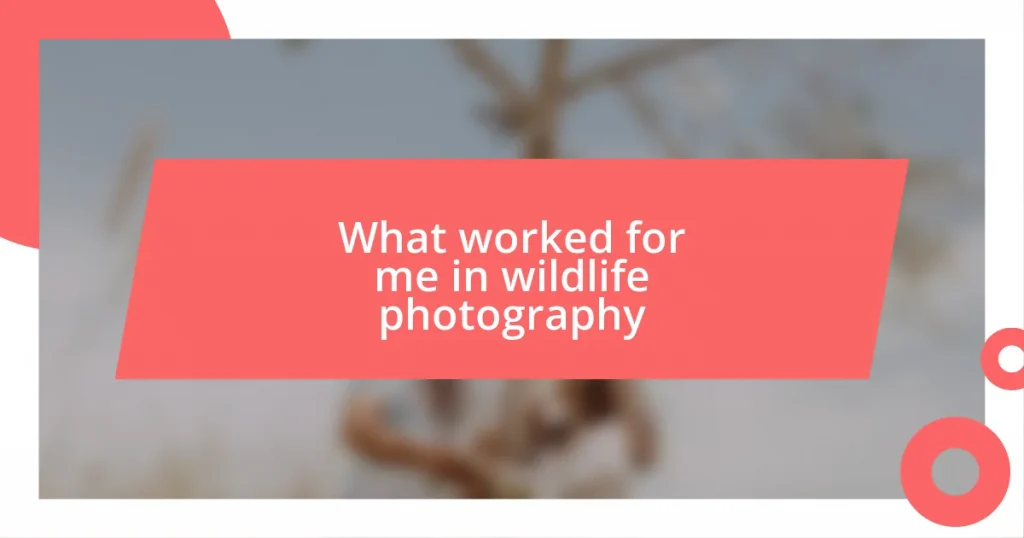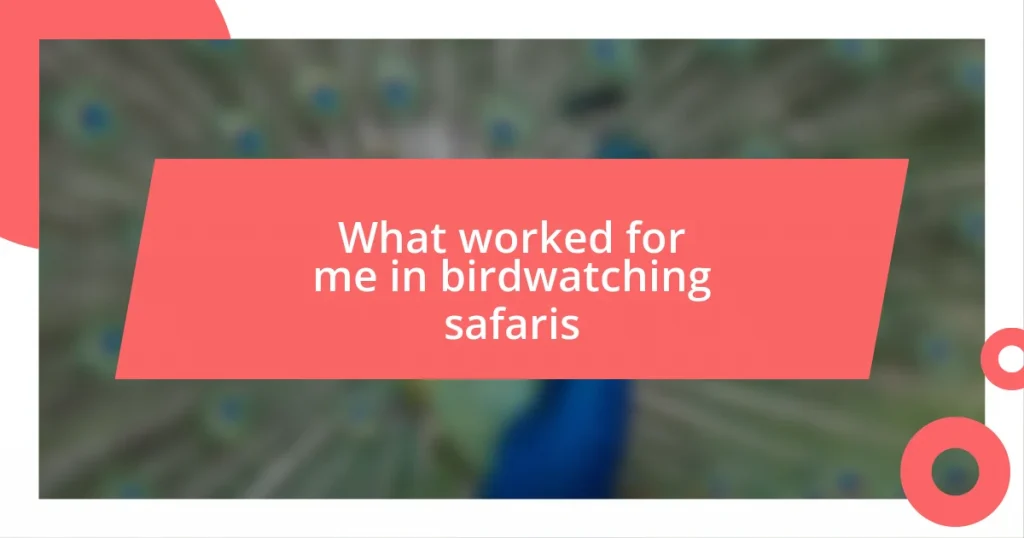Key takeaways:
- Eco-friendly safaris promote conservation and benefit local communities, creating a positive impact on both wildlife and culture.
- Responsible wildlife viewing involves maintaining a respectful distance, choosing the right times to observe animals, and adhering to designated paths to protect ecosystems.
- Supporting local communities through tourism helps empower residents and preserves cultural heritage, emphasizing the importance of mindful spending and connections during travel experiences.
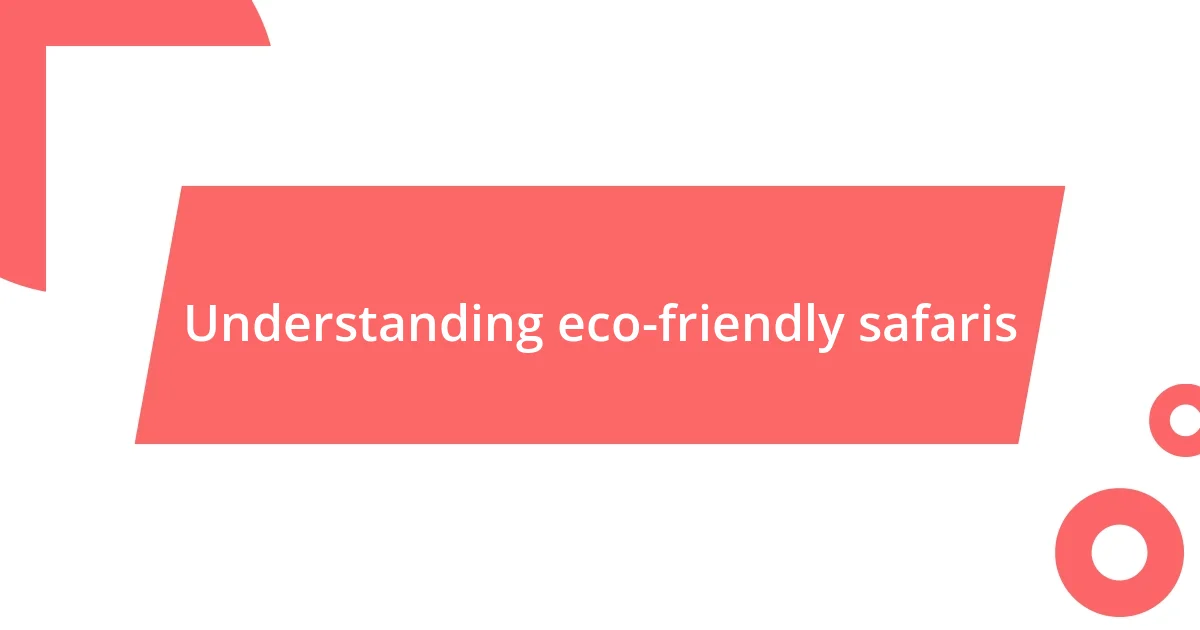
Understanding eco-friendly safaris
Eco-friendly safaris focus on minimizing environmental impact while still offering a thrilling adventure in nature. From my experience, guiding principles include low-impact vehicle usage, sustainable accommodations, and the promotion of conservation efforts. Isn’t it refreshing to think that every adventure can support wildlife protection?
I remember taking a safari in a conservation area where our guide shared how they protected endangered species. It was enlightening to see firsthand how responsible tourism directly contributes to preserving the beautiful landscapes and the creatures that call them home. Experiencing the harmony between humans and nature really deepened my appreciation for these efforts.
These safaris also encourage local communities to participate, ensuring economic benefits flow directly to them. Have you ever thought about the ripple effect of your travel choices? I was amazed to learn that by opting for eco-friendly options, we can uplift local economies while enjoying unparalleled natural beauty. It’s a win-win that makes every smile shared with the locals that much more meaningful.

Choosing the right destination
Choosing the right destination for an eco-friendly safari is more than just picking a stunning location; it’s about aligning your values with the eco-conscious practices of that area. I once found myself in a lush, unspoiled reserve, surrounded by breathtaking wildlife and guided by passionate locals committed to conservation. The moment our jeep rolled into the park, I felt an overwhelming sense of gratitude, knowing that my choice supported sustainable practices and helped protect this amazing ecosystem.
When considering where to go, here are some key factors to keep in mind:
- Wildlife Conservation Practices: Check if the destination actively protects endangered species and habitats.
- Community Involvement: Ensure that local communities benefit from tourism, aiding development and preserving their culture.
- Sustainable Tourism Certifications: Look for lodges and tours that have recognizable eco-certifications, indicating responsible practices.
I remember standing at a viewing point, the sun setting over the savannah, and realizing that every choice I made contributed to preserving that beautiful vista. That moment reminded me that we can create change simply by being intentional about where we travel.
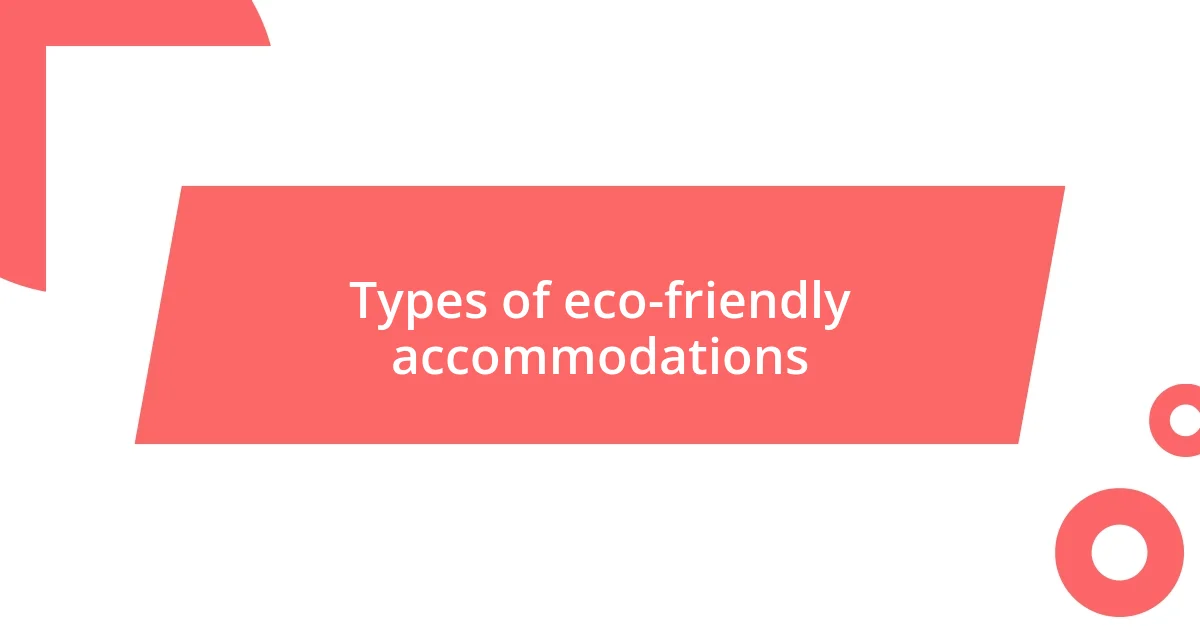
Types of eco-friendly accommodations
Understanding the variety of eco-friendly accommodations can truly enhance your safari experience. I’ve discovered several types, each with unique benefits. For instance, staying in tented camps allowed me to be closer to nature. The sounds of the wilderness at night made for an unforgettable atmosphere, helping me feel like I was part of the environment rather than just a visitor.
Another option I found intriguing was the use of eco-lodges, which often employ sustainable materials and practices. During my stay at one such lodge, I marveled at how everything, from the roofing to the water collection systems, was designed to have minimal impact on the surroundings. It was inspiring to know that my accommodation actively contributed to conservation efforts.
Finally, if you’re looking for an immersive experience, treehouses offer a unique perspective. I spent a night in one and found it exhilarating to be so close to the treetops, observing wildlife as they roamed below. The excitement of waking up surrounded by nature is hard to describe—it’s one I’d recommend trying at least once.
| Accommodation Type | Key Features |
|---|---|
| Tented Camps | Close to nature, immersive experiences, temporary setups |
| Eco-Lodges | Sustainable materials, energy-efficient, supporting local conservation |
| Treehouses | Unique viewpoints, high above ground, interactive wildlife watching |
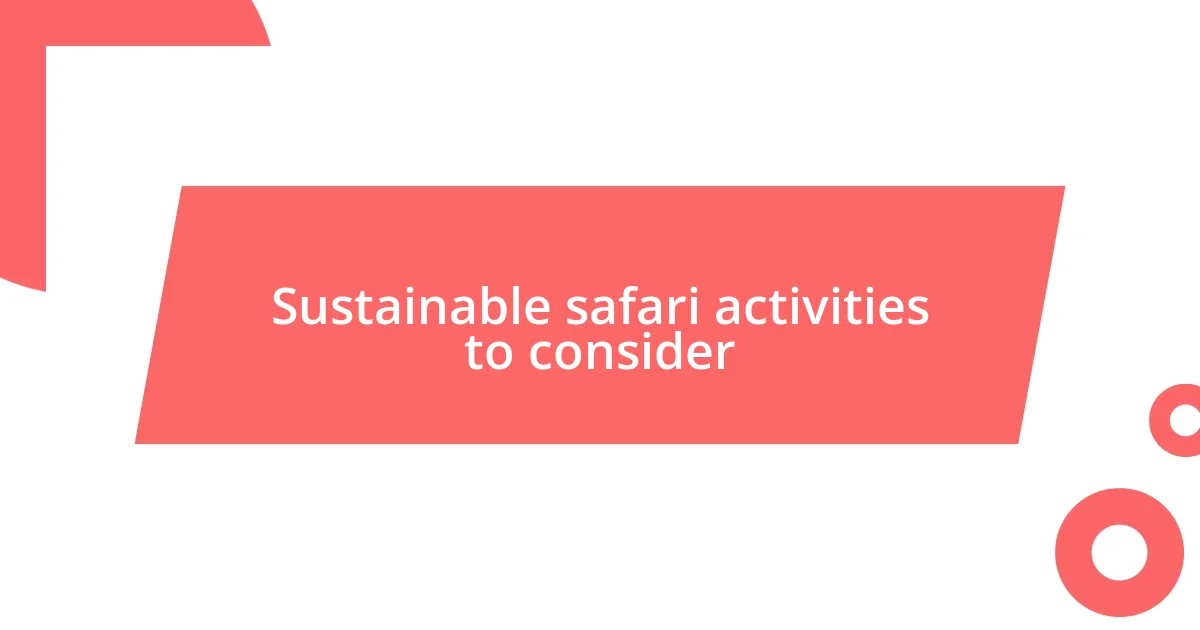
Sustainable safari activities to consider
While on my safari, I had the opportunity to participate in guided walking tours, which truly deepened my connection with the environment. These tours let me slow down and appreciate the intricate details of the ecosystem—tiny footprints in the dirt, the vibrant colors of wildflowers, and even the sounds of birds communicating overhead. Have you ever felt so attuned to nature that you lost track of time? I certainly did, and it made me realize how important it is to immerse ourselves in these experiences.
Another sustainable activity that stood out for me was visiting local conservation projects. I had the chance to engage with researchers who were actively working to protect endangered species. Listening to their passionate stories made me feel like I was contributing to a larger purpose. It was fascinating to learn how each initiative not only safeguards wildlife but also empowers local communities. That day reinforced my belief that tourism can genuinely support conservation efforts.
Lastly, participating in community-led cultural exchanges was an incredibly enriching experience. I remember joining a local family for a traditional meal, sharing laughter, and learning about their customs firsthand. It struck me that through these exchanges, we can support authentic local cultures while leaving a positive impact. What better way to ensure our travels promote sustainability than by connecting with the very heartbeat of the region? I walked away with not just a filled stomach, but a heart full of memories and lessons.
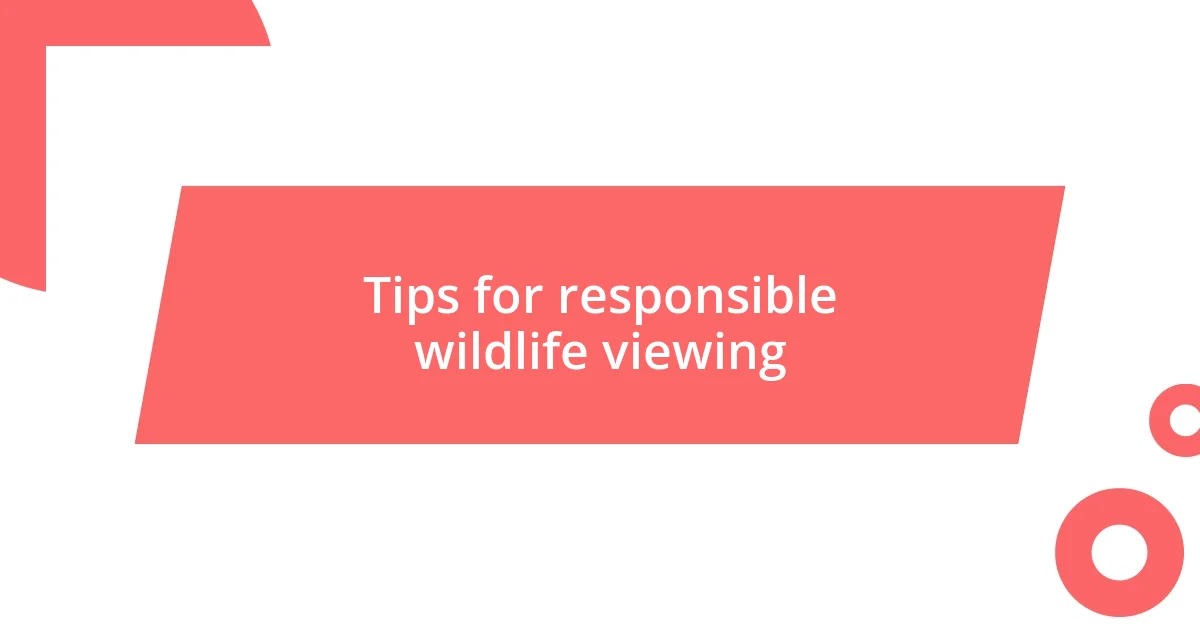
Tips for responsible wildlife viewing
When viewing wildlife, it’s essential to maintain a respectful distance. I remember watching elephants from the safety of our vehicle, feeling both exhilarated and humbled. Those gentle giants deserve their space, and any sudden movements or loud noises from humans can easily disrupt their natural behavior. How would you feel if someone burst into your home?
Choosing the right time for wildlife viewing can also make a significant difference. Early mornings or late afternoons often yield the best sightings, as animals are more active during these cooler parts of the day. During one memorable safari, I awoke before dawn, filled with anticipation. As the sun rose, the golden light illuminated a pride of lions lounging nearby. The atmosphere was magical, creating a deeper connection with the wildlife as I observed their interactions in the soft glow of the sunrise.
Lastly, consider the impact of your actions on the environment around you. I’ve learned to always stick to designated paths and follow the instructions of guides. It’s amazing how stepping off the trail for a better picture can damage fragile ecosystems and disturb wildlife. I once saw a group of tourists chasing after a cheetah for the perfect photo op, and it struck me how easily admiration can turn into intrusion. How can we claim to love wildlife while disregarding their well-being? Respecting their habitat is the most responsible choice we can make as visitors.
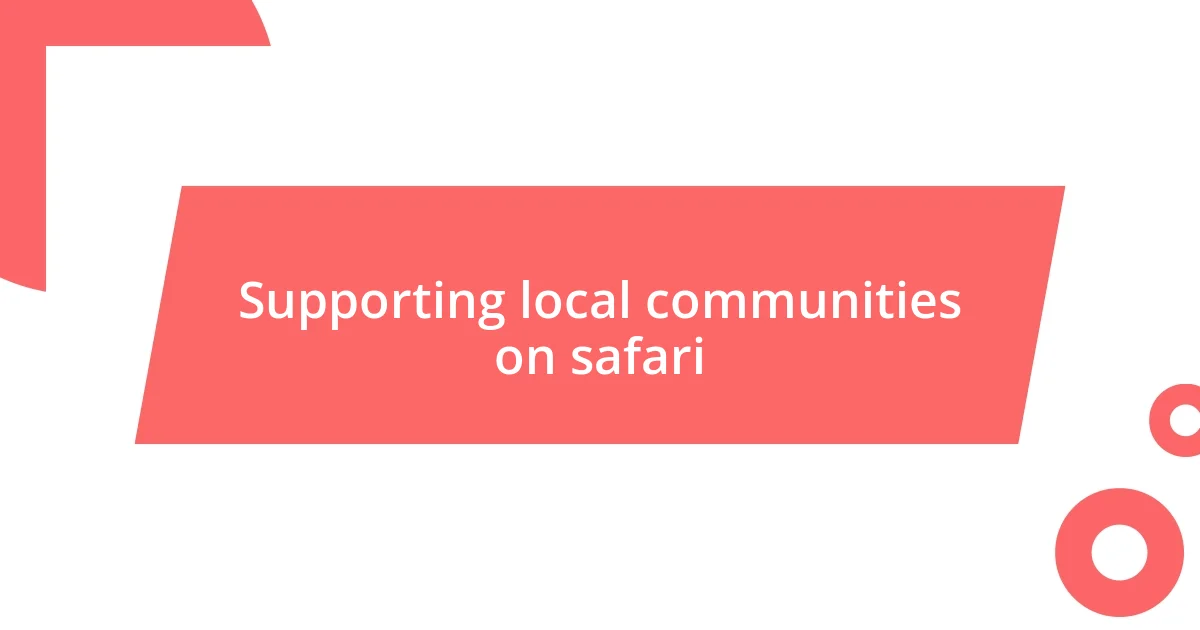
Supporting local communities on safari
Supporting local communities on safari isn’t just a nice addition to the experience—it’s essential. During my travels, I found myself amazed by how much my small contributions could uplift local initiatives. For instance, I took part in a craft workshop where the artisans shared their stories and skills. It was eye-opening to realize that purchasing handmade goods directly supports their families and preserves their cultural heritage. Have you ever felt the warmth of knowing your actions can make a difference? I certainly felt that connection in those moments.
One of the most profound experiences for me was attending a community-led conservation meeting. The locals passionately discussed the challenges they face with wildlife and tourism. Listening to them brought a humbling perspective; their livelihoods depended on the delicate balance of profit and preservation. I left that meeting with a deeper understanding of how our tourist dollars can empower communities. How often do we think about the implications of where we spend our money? For me, it shifted my focus to supporting businesses that prioritize community welfare.
In another enriching encounter, I joined a local guide for a day. Their insights about the land and its traditions were invaluable. Not only did I gain knowledge about the terrain but also heard firsthand how sustainable tourism efforts brought jobs and educational opportunities to the area. This connection is vital; it reminded me that responsible travel can be a force for good. In supporting local communities, we ensure that these remarkable cultures thrive for generations to come. Isn’t that a legacy worth contributing to?
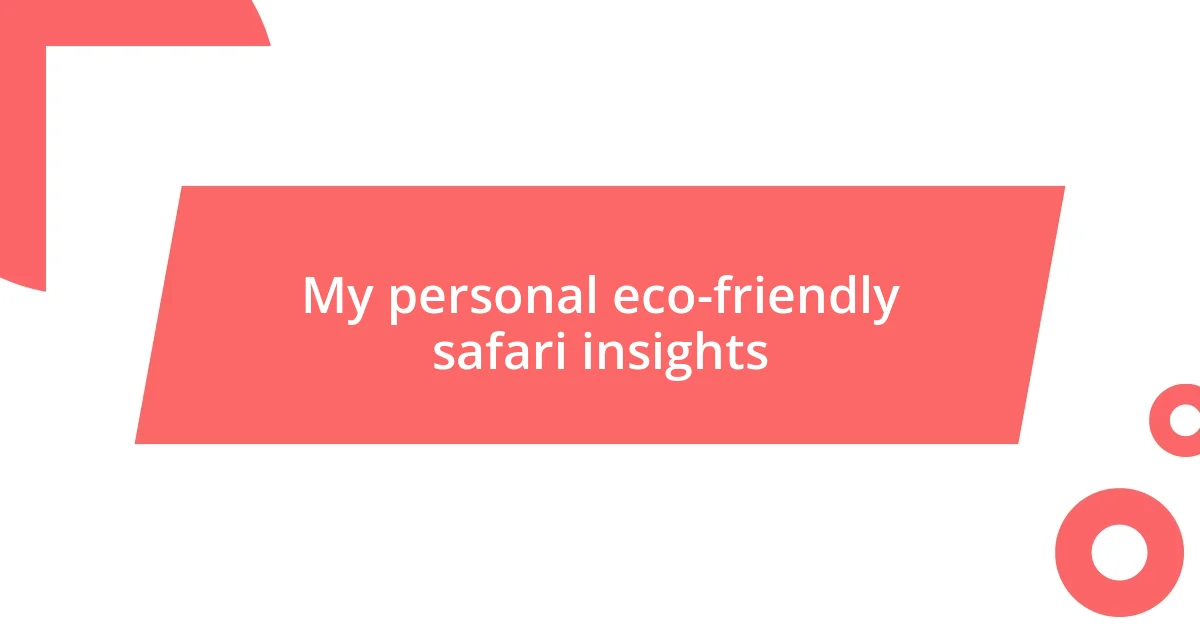
My personal eco-friendly safari insights
Reflecting on my eco-friendly safari experiences, I’ve gained a clearer appreciation for the balance of adventure and responsibility. One day, while we quietly floated in a canoe on a serene river, I was captivated by a family of hippos basking in the sun. There’s something truly special about witnessing wildlife in their natural setting while knowing that we were supporting sustainable practices. How incredible is it to think that our choice of activities can directly contribute to conservation efforts?
Another insightful moment came during a guided walking safari where we learned about the flora and fauna. As I recognized plants that were vital for both ecosystem health and local communities, I felt a profound connection to nature. My guide shared personal stories about how these plants were incorporated into traditional medicine, leaving me in awe of the knowledge passed down through generations. Have you ever had an experience that made you truly see the world differently? I know I did that day, realizing that every aspect of the environment has its purpose.
One of my favorite experiences was at a lodge powered entirely by solar energy. Listening to the gentle hum of nature instead of generator noise allowed me to relax in a way I hadn’t expected. It dawned on me that by choosing eco-conscious accommodations, I’m participating in a movement toward sustainable tourism. Do you ever consider how small choices can lead to bigger changes? For me, it highlighted the importance of making deliberate decisions that honor the earth we love to explore.



